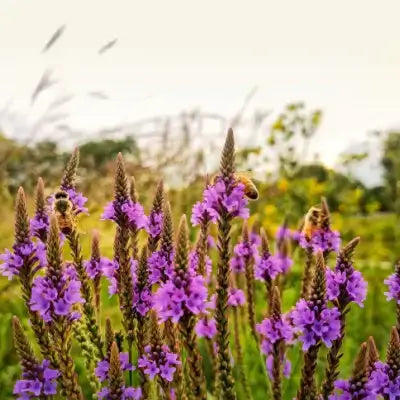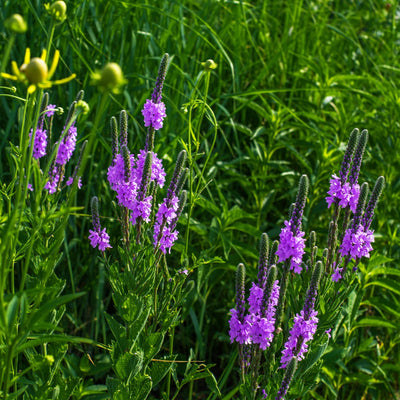Are you looking for a gorgeous flower that will grow well with the other flowers in your home or office landscape? If so, then Blue Vervain Plant could be the plant for you. Also known as Verbena hastata, this is a dark purple and pink flower that grows well in the wild in the local area. Furthermore, this is also a beautiful flower that grows well around other trees and shrubs, making this a great addition to your garden or yard. At Tennessee Wholesale Nursery, we want to offer a wide selection of plants and flowers that you can tailor to meet your needs. Learn more about this gorgeous flower below.
What Does the Blue Vervain Plant Look Like
It is a native, perennial flower that blooms beautifully in our local climate. When fully grown, it stands between two and five feet in height. It has a square, hairy stem that is usually green; however, later in the year, it can take on a slightly red color. In addition, the leaves are shaped like lances and have slight ridges. The leaves progress in pairs up the stem. Each leaf is approximately one inch wide and six inches long. At the top of the flower, gorgeous purple and pink flowers bloom in elongated panicles. Each flower is about five inches in length.
Where Does Blue Vervain Plant Grow
The Blue Vervain Plant is a hearty flower that grows well in various areas. It is a flower that prefers moist conditions. This flower blooms well in full sun as well as shade. In the wild, one can find it in meadows, pastures, thickets, and prairies. Because it likes water, this flower commonly grows along the edges of rivers and marshes. It also makes an ideal home for various animals that want to pollinate this flower. Natively, this flower grows all over North America. It can be found in the New England area, throughout the Southeast, across the West Coast, and even into Canada. Because this flower grows everywhere, it is easy to care for.
Trust Tennessee Wholesale Nursery for Blue Vervain Plant
If you are looking for the Blue Vervain Plant, our team is here to help you. Our flower experts will help you find the perfect arrangement for you. We can help you pair Verbena Hastata with a gorgeous array of plants to put on a show. Give us a call today!
Native Blue Vervain: The Gardener's Treasure
To me, a veteran gardener, there's something extra special about natives like blue vervain (Verbena hastata). And it's earth-shaking to replant something that had existed on our land generations before anyone knew its name. Blue vervain is an evergreen which has been very hardy and pretty. Standing upright with its thin stalks of violet-blue flowers, this plant edifies any garden and supports pollinators.
Blue vervain likes moist meadows near streams and shallow places where its roots can absorb water. I've always liked its adaptability; it likes to grow in wet soils but will also work in less-than-perfect conditions. And it isn't only beautiful in its own right. It's more for the show, attracting native bees, butterflies, and even hummingbirds. With its cacophony of life in the middle of a row of blue vervain, my garden tells me I've made the right choice in natives.
Blue Vervain and a Pollinator
You'll need blue vervain if you're looking for a showy garden. This plant doesn't just make it through; it gives back. It flowers from midsummer until early fall, the most important period for pollinators getting ready for winter. King and queen come here regularly, crashing on the small flowers while they save their money for a long journey. Nectar and pollen for native bees, neglected by the honeybees, are supplied by blue vervain. Planting it is like offering up the land in reverence, ensuring the biome thrives.
As a practical plant, blue vervain is a pipe dream. It asks so little and offers so much. You can place it in full sun or partial shade, and it will not complain. Because it is deeply established, it's drought-tolerant once established but can also live in moist environments. If you're looking for a garden that integrates with nature, not in competition with it, native plants such as blue vervain will do the trick, I always tell people.
It is sagely to plant roots that are the earth. Blue vervain links us to the past and plants the future. It's not just a plant. It is a metaphor for balance, harmony, and natural beauty everlasting.

